Overview
The article titled "10 Essential Tips for Type 2 Diabetes Patients' Management" aims to provide practical strategies for individuals navigating their condition. It highlights the significance of:
- A balanced diet
- Regular exercise
- Blood glucose monitoring
- Understanding your medications
- Prioritizing mental health support
- Participation in support groups
- Regular check-ups
- Staying informed about research
- Setting realistic goals
These are crucial steps to improve health outcomes and enhance the quality of life for those living with type 2 diabetes.
It's understandable to feel overwhelmed by the challenges of managing diabetes. Remember, you are not alone in this journey. These tips are designed to empower you, helping you take control of your health. By embracing these strategies, you can create a supportive environment that fosters both physical and emotional well-being. We are here to support you every step of the way.
Introduction
In a world where diabetes is becoming increasingly prevalent, effective management is key to maintaining health and well-being. It's understandable to feel overwhelmed, but T2DSolutions emerges as a vital resource, dedicated to empowering individuals with Type 2 Diabetes. This platform offers a comprehensive suite of educational tools and community support, helping you navigate your health journey with confidence.
T2DSolutions not only simplifies the complexities of diabetes management with tailored dietary plans and exercise routines, but also delves into critical topics such as the link between Type 3 Diabetes and cognitive health. By fostering a collaborative environment with experts and advocates, T2DSolutions equips you with the knowledge and strategies necessary to enhance your quality of life.
As the statistics surrounding diabetes continue to underscore its impact, the importance of accessible, reliable resources has never been more apparent. Remember, you're not alone in this journey. We are here to support you every step of the way, ensuring that you have the tools and community you need to thrive.
T2DSolutions: Your Comprehensive Resource for Type 2 Diabetes Management
At T2DSolutions, we are dedicated to empowering type 2 diabetes patients. We understand that managing this condition can feel overwhelming for type 2 diabetes patients, which is why we offer a wide array of educational materials designed to simplify their journey. Our platform provides tailored dietary plans, exercise routines, and interactive tools, ensuring you have access to practical strategies for effective care.
It's important to acknowledge that Type 3 Diabetes, which connects to Alzheimer’s disease and insulin resistance in the brain, is also a critical topic we explore. This comprehensive approach equips you with the knowledge you need to make informed choices about your wellness journey.
Recent statistics reveal that 8.0% of adults with blood sugar issues experience a non-HDL cholesterol level of 190 mg/dL or higher. This underscores the significance of the management tools we offer to help type 2 diabetes patients track and enhance their cholesterol levels. Furthermore, it’s concerning that type 2 diabetes patients are twice as likely to encounter depression. This highlights the necessity for thorough educational materials that address both physical and mental wellness challenges.
We partner with specialists, researchers, and advocacy organizations to enhance the reliability of our services. This collaboration not only empowers you but also fosters a supportive community where shared knowledge can lead to improved health outcomes. As noted by the CDC, diabetes was the seventh leading cause of death in the United States in 2014, emphasizing the critical need for reliable information and resources for type 2 diabetes patients; moreover, the highest incidence of type 2 diabetes patients has been observed among Non-Hispanic Black children and adolescents. This further illustrates the importance of providing targeted educational resources for diverse populations. Remember, you’re not alone in this journey. We are here to support you every step of the way.
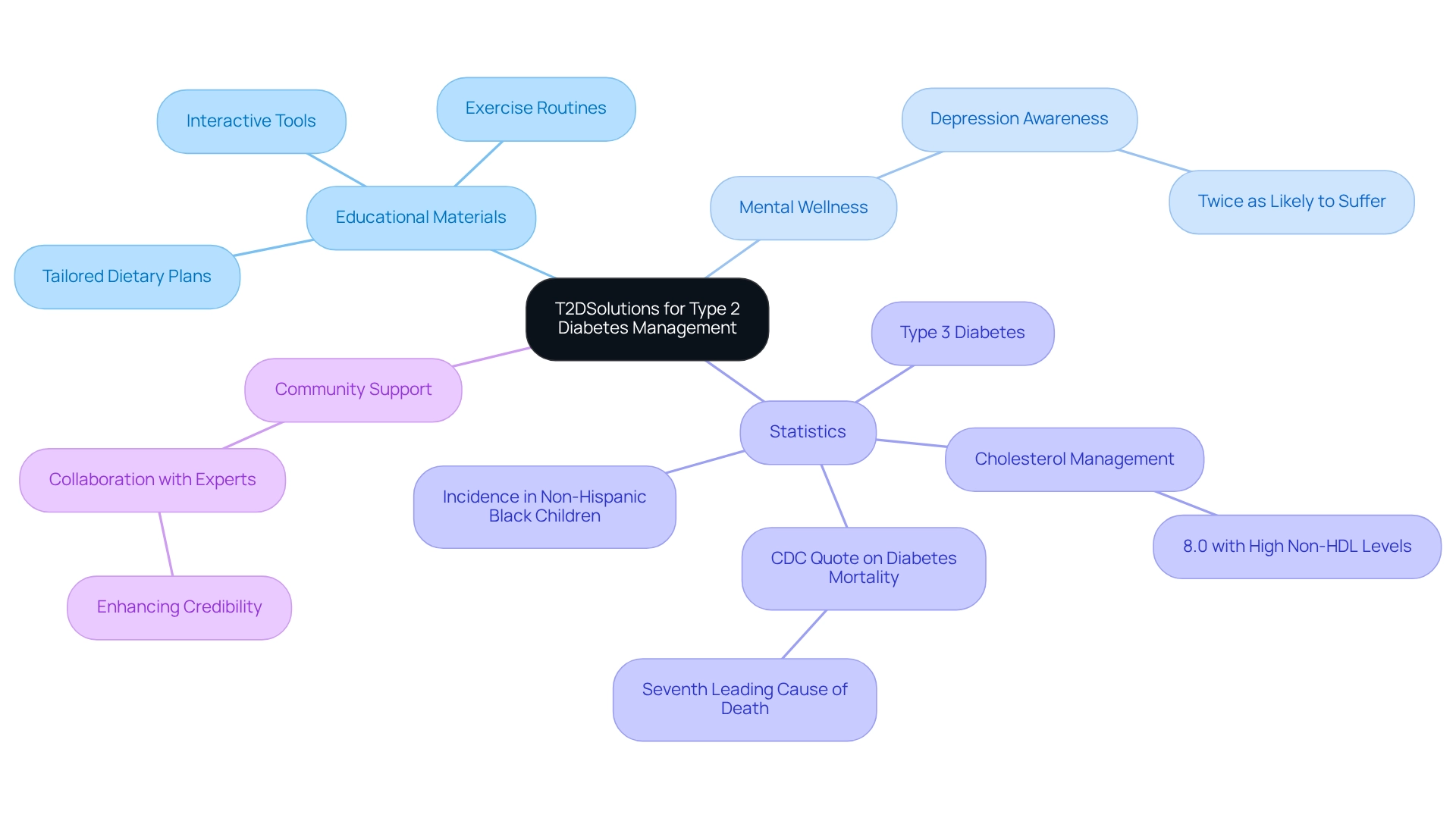
Adopt a Balanced Diet: Focus on Whole Foods and Portion Control
Embracing a balanced diet rich in whole foods is essential for effectively managing Type 2 Diabetes. It’s important to include:
- Fruits
- Vegetables
- Whole grains
- Lean proteins
while reducing processed foods and added sugars. This approach can significantly impact your wellness. Research indicates that dietary habits play a crucial role in diabetes care, with a notable increase in Type 2 Diabetes associated with the consumption of sugar-sweetened drinks. In sub-Saharan Africa, for instance, the burden rose by 9.4 percentage points.
Portion control is equally vital. Utilizing smaller plates and measuring servings can help prevent overeating and maintain stable blood sugar levels. Nutritionists often emphasize the importance of whole foods, highlighting their benefits in promoting better glycemic control. As one nutritionist puts it, "Including whole foods in your diet can result in notable enhancements in blood sugar control and general well-being." Effective dietary strategies show that patients who embrace a balanced diet experience improved wellness indicators and a reduction in diabetes-related complications.
At T2DSolutions, we are here to support you in adopting these dietary changes. Our meal planning tools and educational materials can guide you toward healthier choices. Case studies from long-term wellness data gathering reveal trends in dietary habits and their correlation with disease occurrence. This highlights the significance of whole foods and portion management in controlling blood sugar levels. Current research continues to explore how whole foods affect blood sugar levels, reinforcing that a balanced diet is not just beneficial but essential for managing Type 2 Diabetes now and in the future.
Moreover, focusing on carbohydrate quality in dietary interventions is crucial. This can further enhance glycemic control and overall well-being. Remember, you're not alone in this journey. Explore T2DSolutions for additional resources on effectively managing your diet and blood sugar levels.
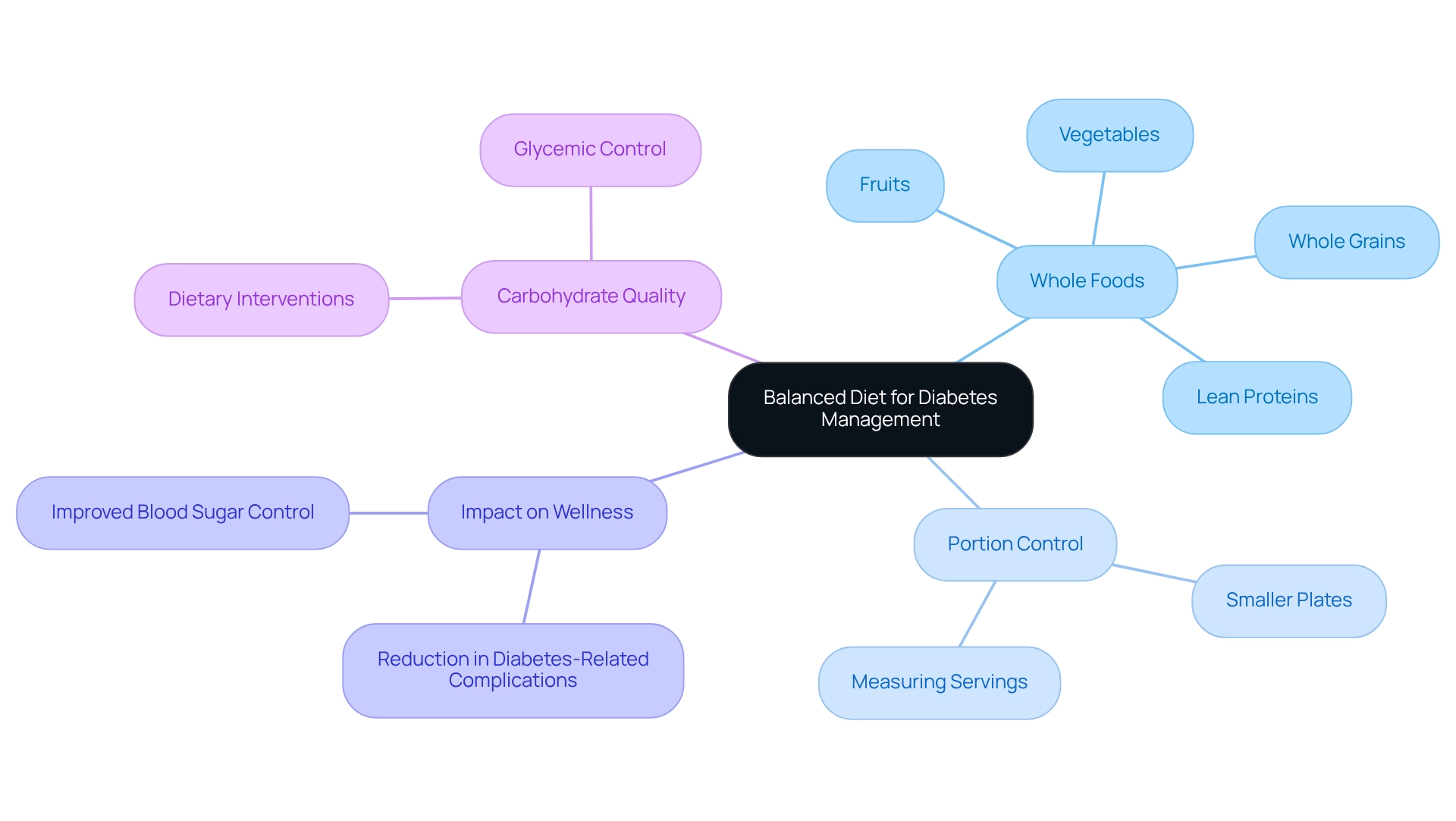
Engage in Regular Exercise: Aim for at Least 150 Minutes Per Week
Engaging in at least 150 minutes of moderate-intensity exercise each week is crucial for improving blood sugar control in individuals with Type 2 Diabetes. Activities such as brisk walking, cycling, and swimming are not only enjoyable but also effective in managing glucose levels. You're not alone in this journey; many find that these activities can bring joy while supporting their health.
Furthermore, including strength training activities at least twice weekly can greatly improve insulin sensitivity and overall well-being. Research indicates that maintaining a consistent exercise routine is vital. For instance, individuals with impaired glucose tolerance (IGT) or impaired fasting glucose (IFG) are at high risk of progressing to Type 2 Diabetes, highlighting the importance of regular physical activity. It's understandable to feel overwhelmed, but remember, establishing a routine is a step toward better health.
It is recommended not to go more than two consecutive days without physical activity to foster a sustainable habit. Collaborating with a friend can provide motivation and accountability, making it easier to stick to your exercise goals. Have you considered finding a workout buddy? Sharing this journey can make a significant difference.
Engaging with a supportive community, such as T2DSolutions, can also enhance your experience. Shared experiences foster resilience, and you're not alone in facing these challenges. T2DSolutions acts as a useful resource center for education and community assistance, providing tools and information to aid you in your care journey.
As you embark on this journey, just make sure to check with your doctor before starting any new or more difficult activity to ensure they align with your health needs. We are here to support you every step of the way.
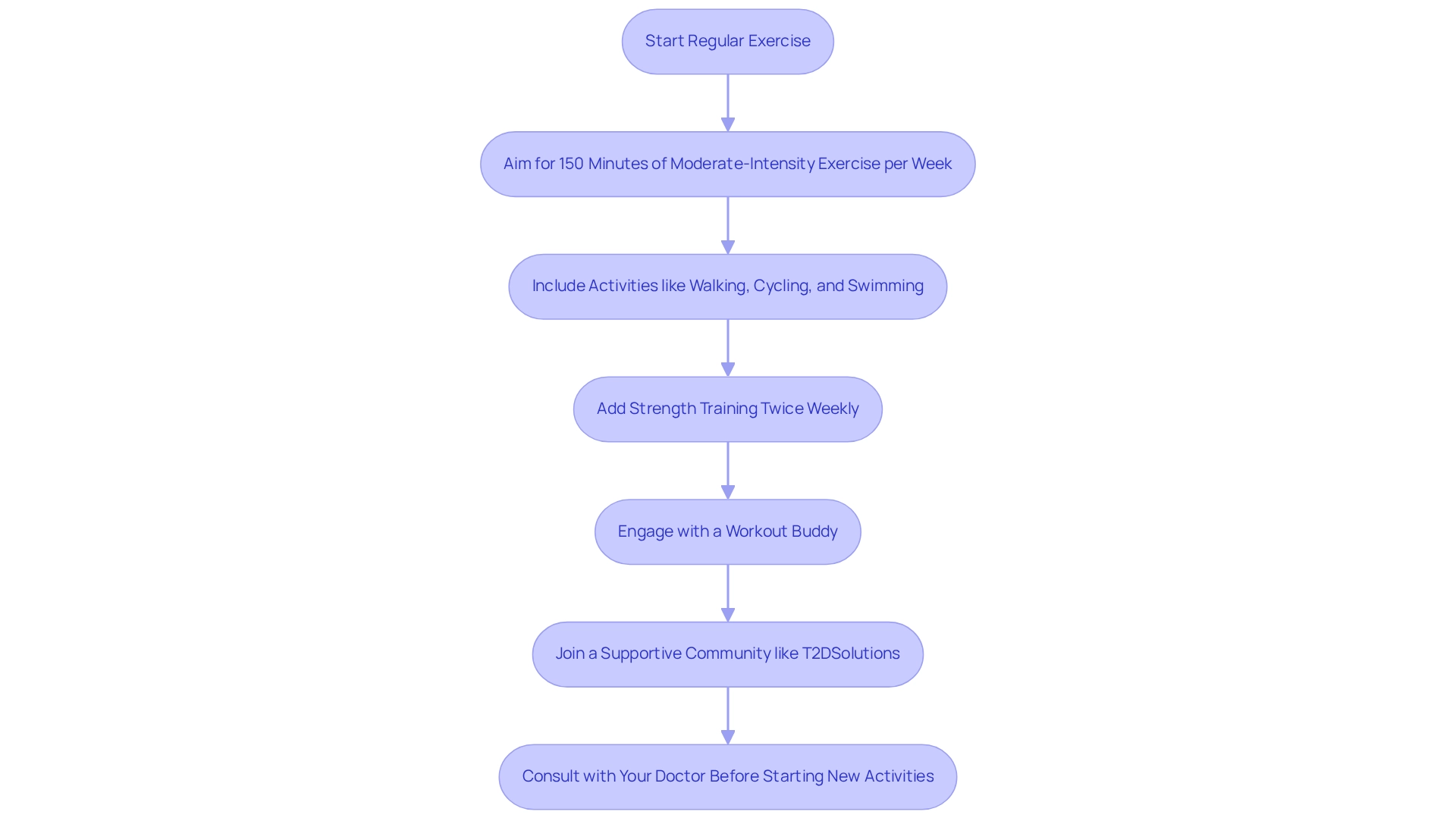
Monitor Blood Glucose Levels: Track Your Progress and Adjust Accordingly
Regular observation of blood sugar levels is crucial for effective control of your condition. Using a glucose meter or a continuous glucose monitor (CGM) allows you to track your levels before and after meals, as well as during physical activity. This data is essential for understanding how different foods and exercises impact your blood sugar, enabling necessary adjustments to your management plan.
Did you know that 39.5% of individuals with high blood sugar have a non-HDL cholesterol level of 130 mg/dL or higher? This statistic highlights an increased risk for cardiovascular disease, underscoring the importance of regular monitoring. By managing your blood glucose levels, you can also help mitigate these risks. Furthermore, from 2012 to 2022, the excess medical costs related to this condition rose significantly. Effective blood glucose monitoring can potentially alleviate financial burdens for type 2 diabetes patients by preventing complications.
Recent case studies show the effectiveness of self-monitoring blood glucose (SMBG) practices. Recognizing individual factors that influence adherence can improve care strategies for managing your condition. For instance, the study titled 'Future Research Directions in SMBG Practices' recommends further investigation into barriers and facilitators of SMBG sharing, which could lead to better outcomes. Experts suggest that ensuring access to CGMs for type 2 diabetes patients in primary care settings can lead to improved outcomes, regardless of their medication treatment.
As we look ahead to 2025, advancements in glucose monitoring technology continue to evolve, offering more accurate and user-friendly options for type 2 diabetes patients like you. Practical examples illustrate how efficient glucose monitoring can lead to better control of blood sugar levels, ultimately enhancing your quality of life. By emphasizing blood sugar tracking, you can take proactive steps in your health journey. Consider setting specific times each day to check your levels and keep a log of your readings to discuss with your healthcare provider.
Additionally, T2DSolutions provides valuable resources and community assistance to help those recently diagnosed manage their condition effectively. You're not alone in this journey—subscribe to stay updated on educational materials and tips that can support you along the way.
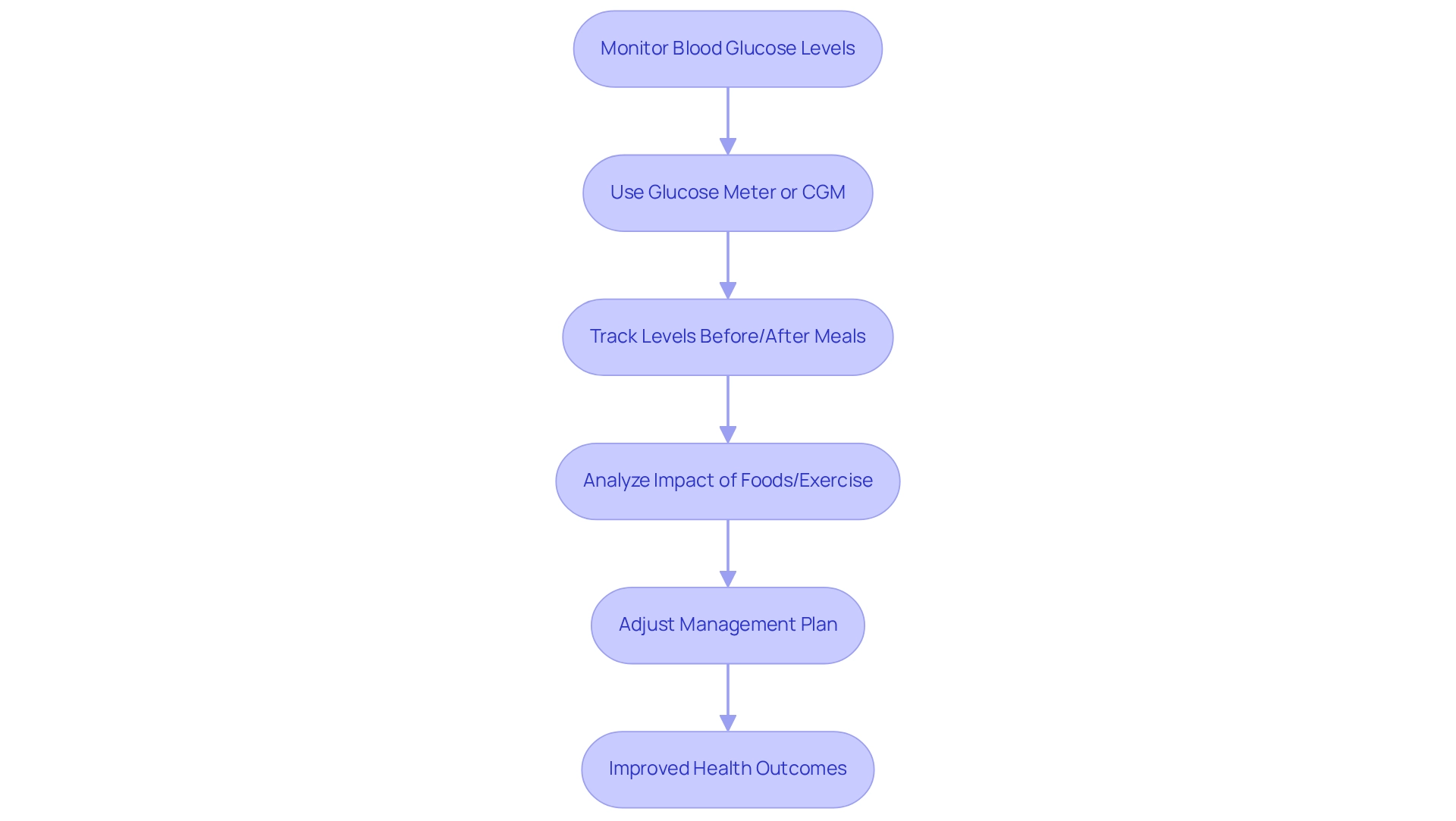
Understand Your Medications: Know How They Help Manage Your Condition
Understanding your medications is crucial for effectively managing Type 2 Diabetes, and T2DSolutions is here to support you on this journey. Familiarizing yourself with the medications prescribed—whether they enhance insulin sensitivity, decrease glucose production, or stimulate insulin secretion—can significantly improve your adherence to the treatment plan. For instance, medications like GLP-1 receptor agonists have been shown to lower cardiovascular risk by 28% compared to conventional sulfonylureas. This emphasizes their importance in providing thorough care for individuals facing blood sugar challenges.
Practical examples illustrate the effectiveness of various medications in managing blood sugar conditions. Meglitinides, such as nateglinide and repaglinide, are FDA-approved drugs that promote insulin secretion in a glucose-sensitive manner. Unlike sulfonylureas, they carry a lower risk of hypoglycemia and weight gain, making them a suitable option for many patients. However, it’s important to exercise caution for individuals with advanced chronic kidney disease due to potential risks.
Current research continues to shed light on the effectiveness of glucose control medications, addressing gaps in understanding, particularly regarding SGLT-2 inhibitors. Notably, this research received no external funding, which speaks to the integrity of the findings. Engaging with your healthcare provider about your medication plan is essential. Discussing how each medication works and its potential side effects can empower you to make informed decisions about your treatment. Additionally, data suggest that medication compliance among type 2 diabetes patients is crucial for achieving the best possible results, highlighting the importance of open dialogue with healthcare providers. By comprehending your treatments and their roles in managing your condition, you can actively participate in your care journey. Remember to consult your healthcare provider regarding your medication plan and how to follow it for improved wellness outcomes. For more details and resources on managing your condition, visit T2DSolutions, your comprehensive center for education and community support.
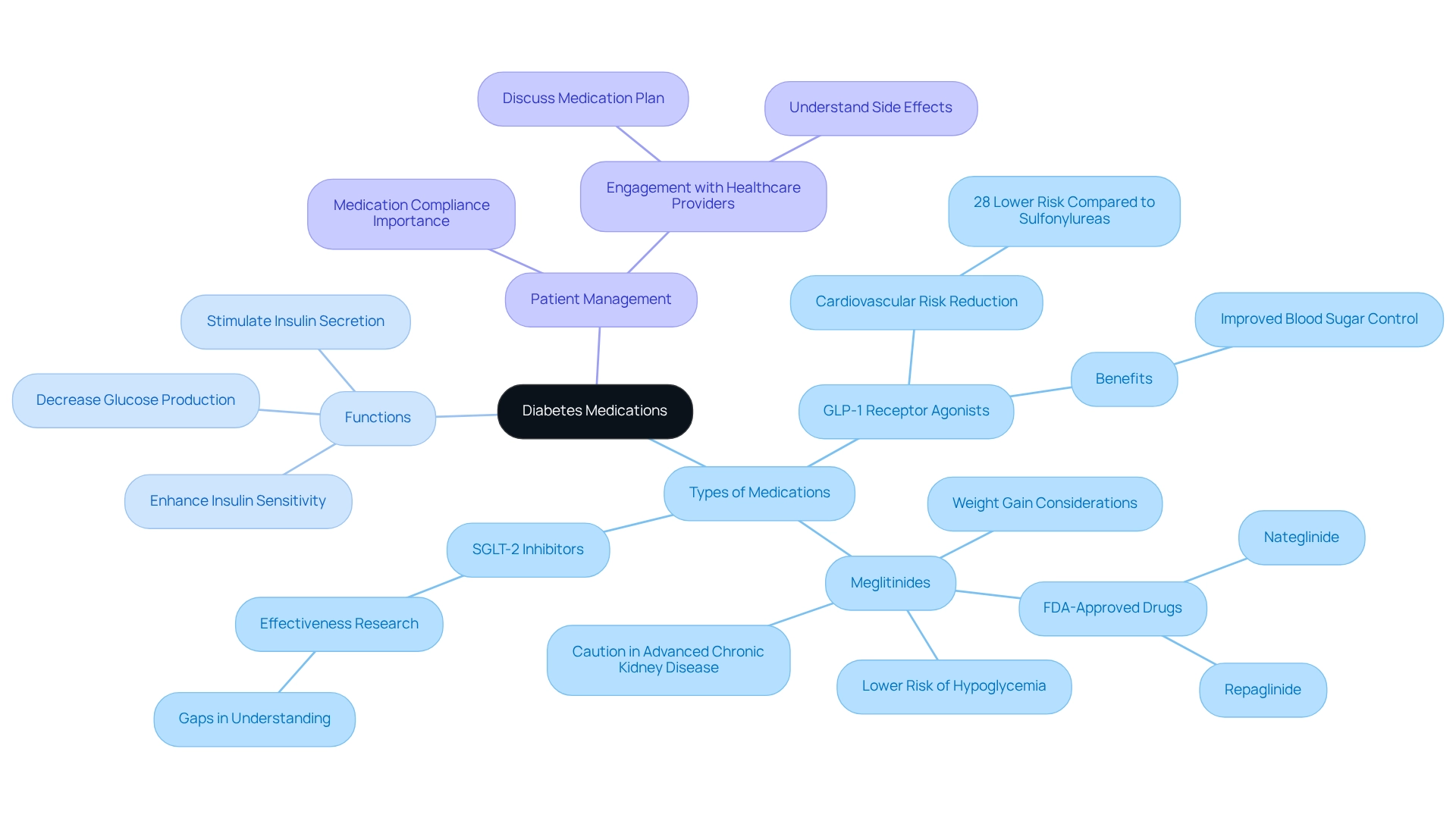
Prioritize Mental Health: Seek Support and Counseling When Needed
Managing this condition often presents significant emotional challenges, making it essential to prioritize your mental health. It's understandable to feel overwhelmed, and seeking support from counselors or joining support groups can be invaluable. Participating in therapy not only addresses feelings of stress, anxiety, or depression but also promotes resilience—an essential element for effective health control. Research indicates that type 2 diabetes patients face an increased risk for mental well-being concerns, with studies revealing that nearly 30% of them experience anxiety or depression. This emotional burden can complicate daily oversight and lead to poorer health outcomes.
A case study from T2DSolutions illustrates the transformative power of community support. By establishing a platform for individuals to share their experiences, users indicate feeling more connected and optimistic, which improves their overall management of the condition. For instance, many users have noted improvements in their daily routines and emotional well-being after participating in community discussions. Mental wellness experts emphasize that addressing emotional well-being is equally important as managing physical symptoms. As Dr. Douglas Villarroel stated, "If we do that with every patient, the world can change."
Integrating mental well-being assistance into blood sugar management can lead to enhanced results for type 2 diabetes patients. Counseling has been shown to reduce stress levels, which directly impacts blood sugar control. Consequently, it’s essential for patients to understand the significance of mental well-being resources and proactively pursue assistance when necessary. By emphasizing emotional well-being, you can manage your health journey more effectively, ultimately resulting in an improved quality of life. To take action, consider reaching out to local assistance groups or mental health experts who focus on managing diabetes. Remember, you're not alone in this journey, and we are here to support you every step of the way.
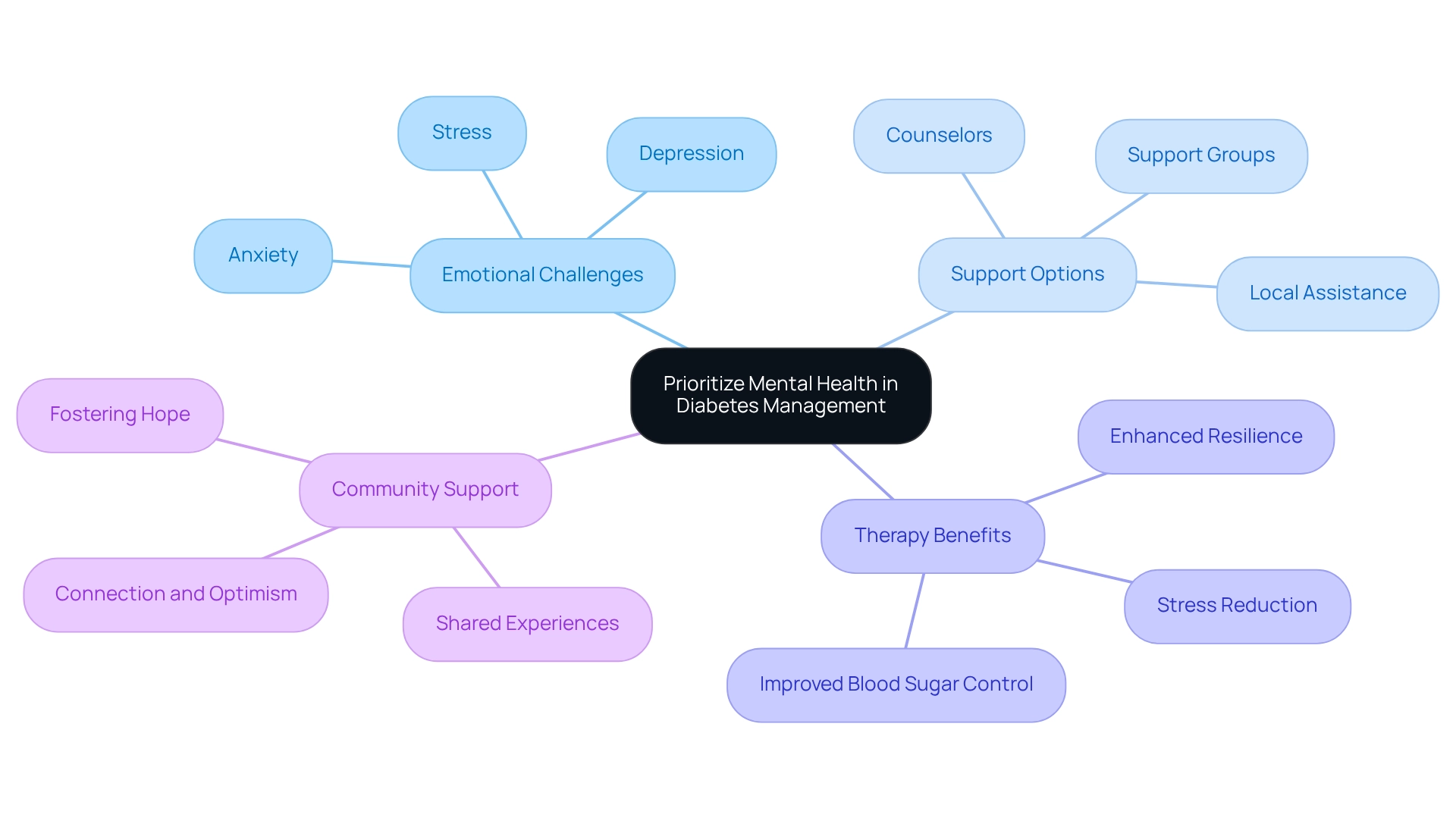
Join a Support Group: Connect with Others for Shared Experiences
Participating in a support group can significantly enhance type 2 diabetes patients' ability to manage the illness. These groups provide emotional support and practical guidance from individuals who share similar experiences. In this safe environment, members can openly discuss their challenges, celebrate successes, and offer encouragement, fostering a sense of community that alleviates feelings of isolation.
At T2DSolutions, we are excited to announce our launch as a comprehensive resource for managing diabetes-related issues. Our platform is dedicated to empowering individuals and families through community support and education, assisting newly diagnosed patients in navigating their journey with Type 2 and Type 3 conditions.
Research shows that involvement in assistance groups leads to notable improvements in health outcomes. For instance, studies on shared medical appointments (SMAs)—structured group visits that allow patients to receive care and support simultaneously—have demonstrated significant reductions in HbA1c levels. This highlights the effectiveness of peer support in managing blood sugar levels. As Dr. Vincent Bryan Salvador states, "Our findings emphasize the significance of glucose management education (DE) as a component of the treatment strategy for individuals with DM." Participants in these studies reported enhanced self-efficacy and improved health behaviors, showcasing the empowering effects of community engagement.
If you're looking to locate assistance groups in 2025, consider reaching out to nearby hospitals, community centers, or organizations like the American Diabetes Association. They often provide resources and directories for these groups. Many organizations now offer virtual meetings, making it easier to connect with others, regardless of your location. Engaging with these groups not only offers valuable insights into managing your condition but also fosters resilience through shared experiences.
Experts emphasize that incorporating peer support into healthcare strategies for individuals with diabetes can lead to improved health outcomes. By participating in groups with others who share similar experiences, you can benefit from the collective wisdom and motivation of your peers, making your journey toward effective health management smoother and less daunting. However, it’s important to acknowledge that studies on SMAs have limitations, including sample size and data availability, which may affect the generalizability of the findings.
We encourage you to subscribe to T2DSolutions for updates on new content and resources that will support you in your health journey.
Schedule Regular Check-Ups: Collaborate with Your Healthcare Team
Scheduling regular check-ups with your healthcare team is vital for effective management of type 2 diabetes patients. These appointments not only allow for essential modifications to your treatment plan based on your progress but also help in detecting any developing medical issues early on. Regular screenings for complications, such as eye and kidney conditions, are crucial components of this process.
It's understandable to feel overwhelmed, but statistics show that following regular examinations significantly influences overall well-being. Research indicates that over 90% of type 2 diabetes patients identified during their initial visit benefit from continuous monitoring. Moreover, collaboration with healthcare professionals has been shown to enhance the management of type 2 diabetes patients, resulting in better outcomes.
For instance, Nick Jonas shares how understanding his condition and maintaining consistent wellness monitoring has helped him manage low blood sugar while performing on stage. His proactive approach underscores the importance of regular check-ups; by prioritizing these appointments, you empower yourself to take charge of your well-being and navigate your diabetes journey with confidence.
To further assist you in managing your condition, consider utilizing resources from T2DSolutions. These tools provide valuable information tailored for newly diagnosed patients. Remember, you're not alone in this journey; we are here to support you every step of the way. So, make sure to schedule your next check-up and stay informed about your health!
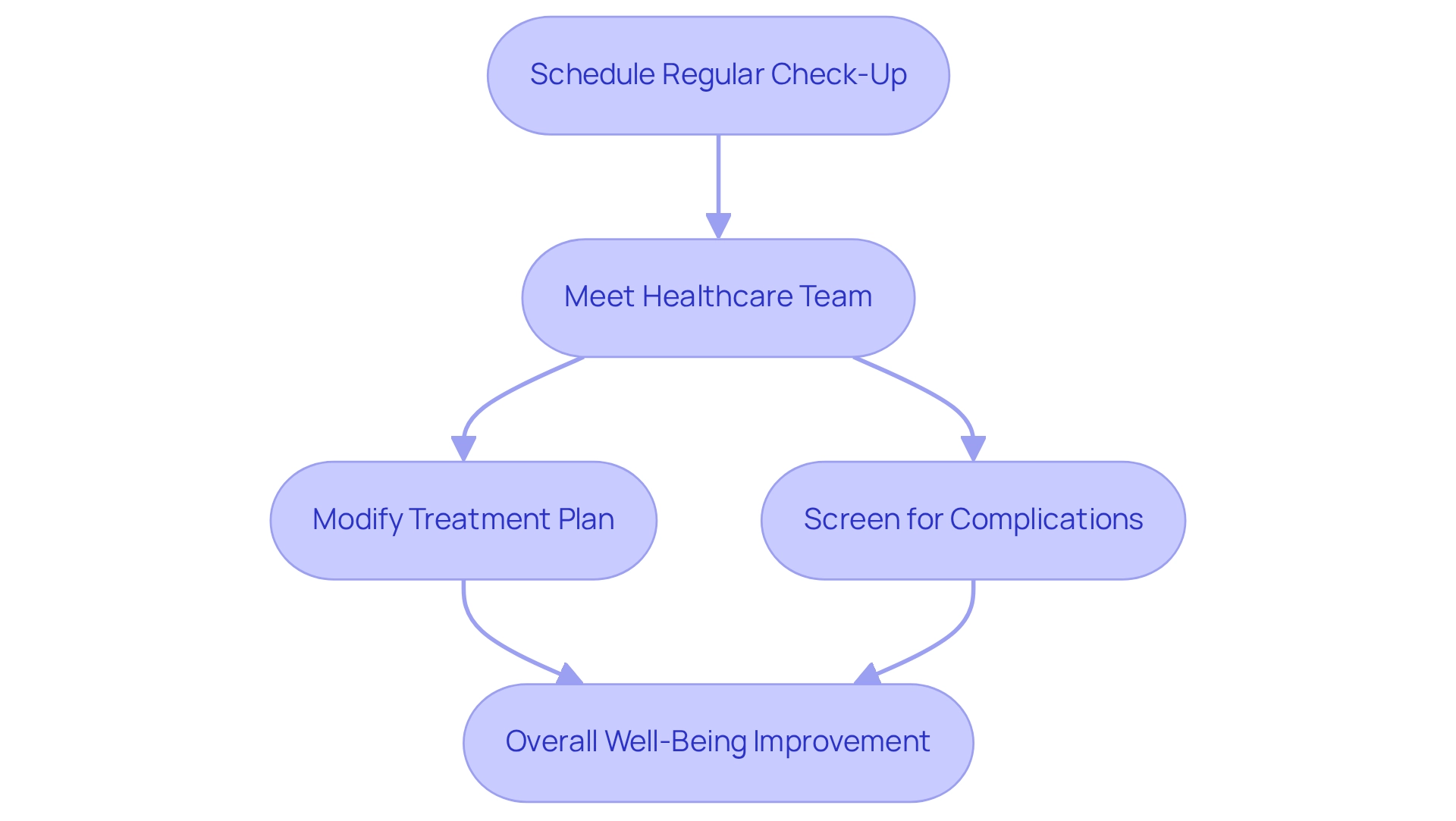
Stay Informed: Keep Up with the Latest Diabetes Research and Treatments
Staying informed about the latest studies and advancements in blood sugar control is crucial for effective management. Engaging with reliable sources such as medical journals, health organizations, and healthcare professionals can provide valuable insights into new medications, technologies, and management strategies. For instance, recent research highlights significant strides in managing diabetes-related conditions, including innovative therapies that tackle insulin resistance and improve glycemic control.
Participating in workshops and webinars offered by organizations like T2DSolutions and the American Diabetes Association can further enhance your knowledge and skills. These platforms often feature specialists who discuss the latest advancements in blood sugar research, including discoveries from 2025 that reveal promising new therapies and their potential impact on patient care.
Additionally, it's essential to grasp the economic implications of this condition. Research shows that individuals with diagnosed blood sugar issues face medical expenses that are 2.6 times higher than those without the condition. The financial burden on society includes increased direct healthcare costs and diminished productivity, underscoring the importance of effective control strategies.
As stated by the Centers for Disease Control and Prevention, "The number of adults with diagnosed prediabetes is significant, with millions affected across various demographics." By actively seeking information and engaging with the community focused on health issues, including resources from T2DSolutions, you empower yourself to make informed choices about your well-being and improve your overall quality of life.
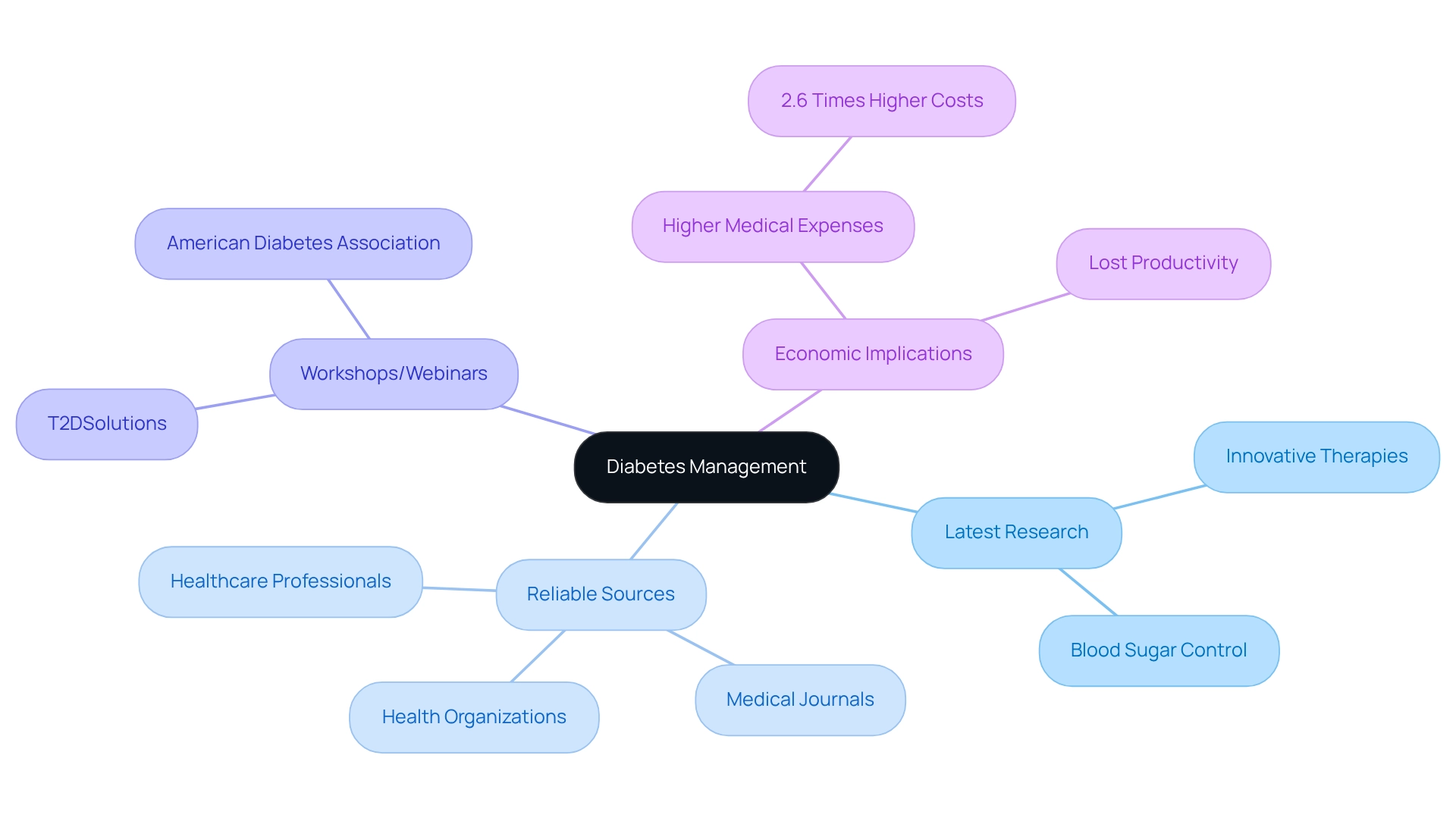
Set Realistic Goals: Create a Personalized Diabetes Management Plan
Establishing realistic and achievable objectives is crucial for effectively managing your condition. By employing the SMART criteria—Specific, Measurable, Achievable, Relevant, and Time-bound—you can create goals that focus on dietary modifications, exercise routines, and blood sugar monitoring. For example, instead of setting a vague goal like 'eat healthier,' you might specify, 'include two servings of vegetables in each meal.'
Regularly reviewing and adjusting these goals is essential; it helps maintain your motivation and ensures you’re making progress. Research shows that patients who establish SMART objectives experience fewer medication adjustments. In fact, the average in the SMART goal group is 0.9 injectable medications, compared to 0.8 in the control group, which leads to better management of their condition.
Real-world examples demonstrate that concentrating on one element at a time, such as boosting physical activity or improving meal plans, can lead to considerable wellness advantages. As Reed Davis, HHP, CNT, wisely states, 'Health coaches can do a lot in this world. We’ve actually been doing it for a long time, and now the world’s catching up. It’s recognizing the power.'
By personalizing your management plan and considering the support available through T2DSolutions—a new resource hub for diabetes education—you can create a sustainable path toward better health outcomes. Remember, you're not alone in this journey; we are here to support you every step of the way.
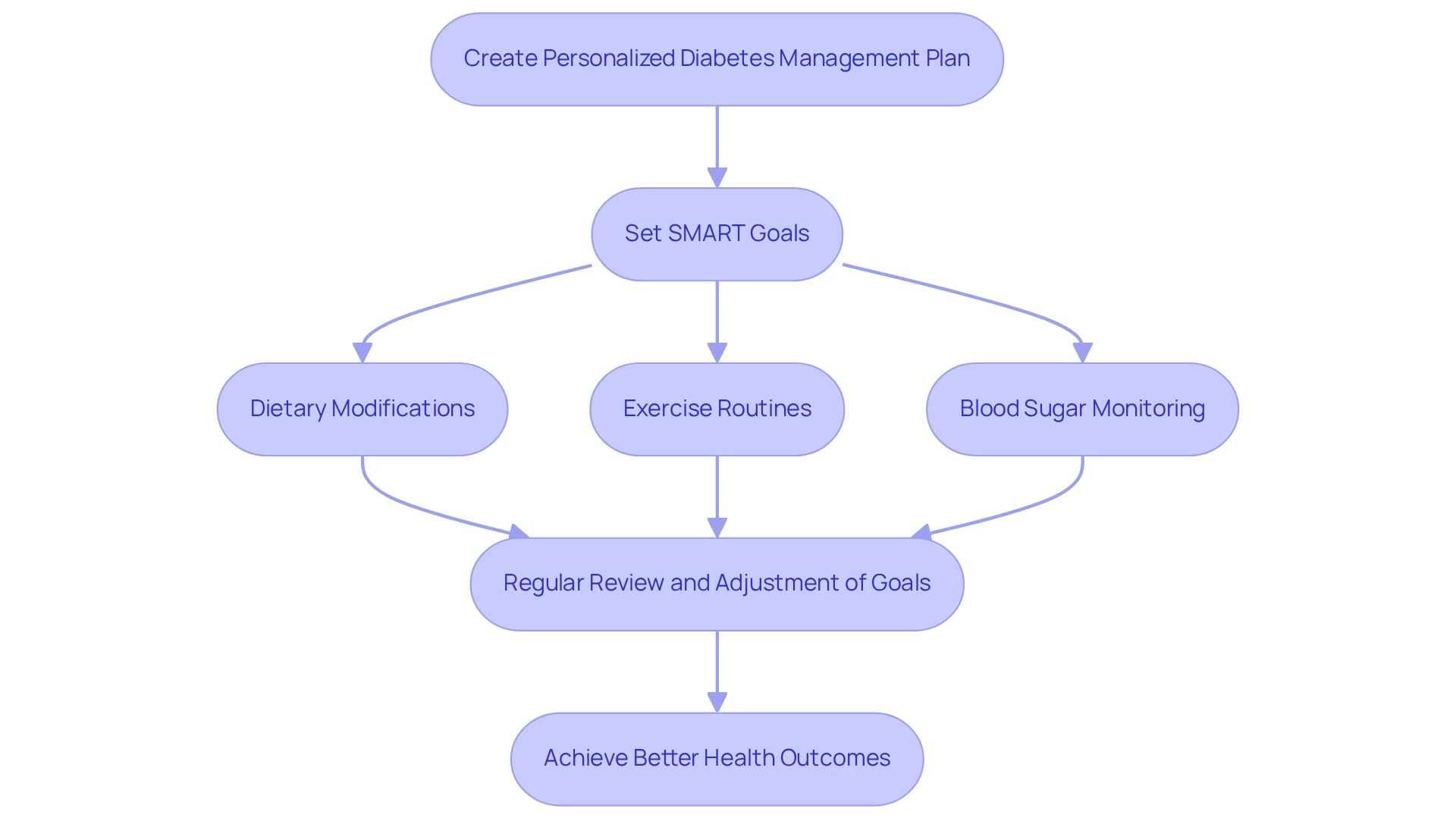
Conclusion
At T2DSolutions, empowering individuals with Type 2 Diabetes through comprehensive education and community support is at the heart of our mission. We provide essential resources, including tailored dietary plans, exercise routines, and insights into critical topics like the connection between Type 3 Diabetes and cognitive health. By utilizing these tools and engaging with a supportive community, you can navigate the complexities of diabetes management with confidence.
It's essential to adopt a balanced diet, engage in regular exercise, and monitor your blood glucose levels. These proactive steps not only enhance your physical health but also address the emotional challenges many face while living with diabetes. Prioritizing your mental health and seeking support through counseling or peer groups can lead to improved resilience and overall well-being.
Regular check-ups and staying informed about the latest research further empower you to take control of your health. Setting realistic goals using the SMART criteria helps create personalized management plans that foster sustainable progress. As diabetes continues to impact millions, T2DSolutions stands as a vital resource, ensuring that you never have to face this journey alone.
Ultimately, by embracing the strategies and support offered through T2DSolutions, you can enhance your quality of life and achieve better health outcomes. The journey may be challenging, but with the right tools and a caring community, it is possible to thrive and enjoy a fulfilling life. Remember, you're not alone in this journey; we are here to support you every step of the way.
Frequently Asked Questions
What is T2DSolutions and how does it support type 2 diabetes patients?
T2DSolutions is dedicated to empowering type 2 diabetes patients by providing a wide array of educational materials, tailored dietary plans, exercise routines, and interactive tools to simplify their management of the condition.
What is Type 3 Diabetes and why is it important?
Type 3 Diabetes refers to the connection between Alzheimer’s disease and insulin resistance in the brain. T2DSolutions explores this topic to equip patients with knowledge for informed wellness choices.
What recent statistics highlight the importance of managing cholesterol in type 2 diabetes patients?
Recent statistics show that 8.0% of adults with blood sugar issues have a non-HDL cholesterol level of 190 mg/dL or higher, emphasizing the need for management tools to help track and improve cholesterol levels.
How does type 2 diabetes relate to mental health?
Type 2 diabetes patients are twice as likely to encounter depression, highlighting the necessity for educational materials that address both physical and mental wellness challenges.
Who does T2DSolutions collaborate with to enhance its services?
T2DSolutions partners with specialists, researchers, and advocacy organizations to enhance the reliability of its services and foster a supportive community for improved health outcomes.
What dietary components are essential for managing Type 2 Diabetes?
A balanced diet rich in whole foods, including fruits, vegetables, whole grains, and lean proteins, while reducing processed foods and added sugars, is essential for managing Type 2 Diabetes.
What role does portion control play in managing diabetes?
Portion control is vital for preventing overeating and maintaining stable blood sugar levels. Using smaller plates and measuring servings can aid in this effort.
How does exercise contribute to managing Type 2 Diabetes?
Engaging in at least 150 minutes of moderate-intensity exercise each week, along with strength training at least twice weekly, can significantly improve blood sugar control and insulin sensitivity.
What recommendations does T2DSolutions provide for establishing an exercise routine?
It is recommended not to go more than two consecutive days without physical activity and to consider collaborating with a friend for motivation and accountability in sticking to exercise goals.
What should individuals do before starting a new exercise routine?
Individuals should check with their doctor before starting any new or more difficult activity to ensure it aligns with their health needs.



